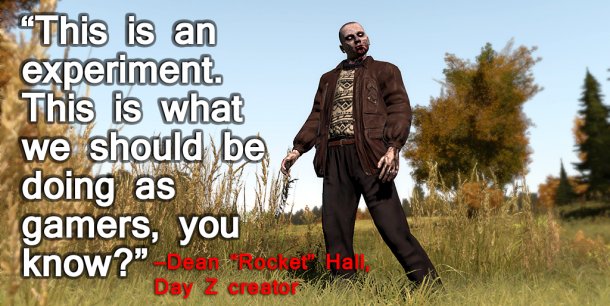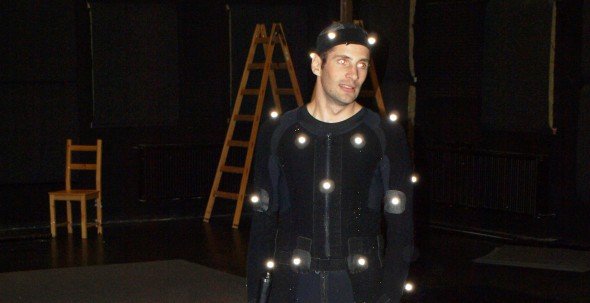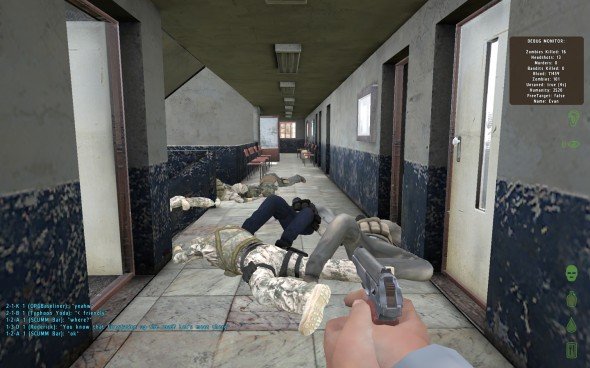Day Z interview -- how zombies + Arma 2 created gaming's best story machine

Day Z will be one of the most important things to happen in gaming this year. It's an open-world, persistent, PvP and PvE zombie survival mod built atop a hardcore military simulator. And despite its harsh mechanics, permadeath, and absence of instruction, it's spreading like wildfire. More than 48,000 unique players are in the alpha, and the thing you need to play it, Arma 2: Combined Operations , hovered at the top of Steam top sellers this week.
I spoke the mod's creator, Dean "Rocket" Hall, over Skype. We chatted for an hour about player emotions, AI programming, Minecraft, and what features to expect next in Day Z—like dog companions. Hall joined Bohemia Interactive in January as a Game Designer on Arma 3.
For easy reading, I've specified below which topics are covered per page.
Page 1
Inspiration, difficulty, backpacks, the value of unbalanced gameplay, the Arma community
Page 2
Dean's best story, optimization, adding a narrative to Day Z, direct chat
Page 3
New features, Day Z dog companions, increased sales of Arma 2, Day Z in Arma 3, Kickstarter

PCG: When zombie games were emerging a few years ago, you'd see people daydreaming about a game like Day Z on forums and in comment threads: “What if Left 4 Dead had a barricading system?” or “What if Dead Island was 50 players instead of four?” I think I'm just amazed that Day Z exists; I feel like you've made a wonderful proof-of-concept or prototype for a game that wasn't supposed to happen for several more years.
The biggest gaming news, reviews and hardware deals
Keep up to date with the most important stories and the best deals, as picked by the PC Gamer team.
Dean “Rocket” Hall: I wasn't sure it would have the broad appeal as a proof of concept. I just didn't really get a lot from games. I really enjoyed games like Dead Island and Left 4 Dead. But it wasn't giving me what I wanted. I wanted context. I wanted to feel moved, I wanted to be angry. I wanted to give up on the game in disgust only to come back to it in two days. Anything, you know? If I was going to be spending my time I wanted to feel some emotion out of it. And I think that was the important thing.
I didn't really talk about mechanics, as in “I wish it had barricading,” or “I wish it had this.” I talked about it with my friends and said “what kind of situations do I want to put people in?” And, what decisions do I want them to make? The classic one is: I've only got so much room in my pack, am I going to take those beans, or am I going to take their ammunition? Because I need to eat, but I need to shoot zombies. So, all those little tensions in someone's head, and then the funny thing is, people can be running around for an hour and have nothing happen. Yet their heart's pumping, and the adrenaline's going, because they just don't know what's going on.
Backpacks are actually an instance of really good design to me in Day Z, because they fold into other concepts pretty elegantly. You don't need a separate mechanic for something like... well, think of it this way. I can pose as a rookie player by carrying around certain equipment, right? By picking up an ALICE Pack, I look a little bit more experienced, I'm a little bit more of a target, right?
Hall: Yup. Yeah, exactly.
That's really interesting. There's not some big indicator over someone's head about their level, or something. The trade-off for having a bigger backpack is that it literally become a kind of target on your back. How do you restrain yourself from building a bunch of HUD to explain design like that?
Hall: I was actually very reluctant even about the HUD, but it's very difficult to describe whether someone is hungry or whether they're bleeding. I have quite a bizarre looking bleeding mechanic, but it gets the message across. But, it was like I didn't even want to have that stuff on the HUD, but kind of need to have some of those elements.
Even for an experienced Arma player, Day Z can be brutal. I mean, I mostly play Day Z at night, and Arma is one of the only games that has this opaque, almost unplayably-dark night. Why do you think players are okay with enduring that? Why is the mod becoming popular in spite of its, like...malevolence?
Hall: When I play a game like Company of Heroes with my friends, we always ramp the difficulty up to expert, and we'll get smashed for like ten times or whatever. I've always liked playing some bit of a challenge and I'm sure that's what your attraction is with Arma as well. It's the lack of balance that actually provides you with quite a compelling experience. So I made a deliberate decision with it to follow where Arma was going and just provide that context around it and just use Arma to generate emotions in people. In a way it almost becomes an “anti-game” because you're not sitting there going “OK, well we've got this weapon that needs this balance” or “these people are starting in this way, we need to balance it for when they go into the cities.”

So is that freeing for you as a designer to be in a situation where you're just focusing on creating player feelings, and not worrying about whether or not this gun is dealing more damage per second than another gun or if this zombie is a little too fast?
Hall: I think it's exciting because you really do feel out of your comfort zone. But I also think it's quite scary for designers, because you're almost putting your heart on your sleeve, because you're choosing a mechanic but you don't often have a basis for how that mechanic works unless you say it is realistic or it's authentic. So people will turn around and criticize that and say “it's not balanced at all, it's terrible, I hate it, I'm dying.” So it really does open you up for some strong criticism.
Sure.
Hall: I've found it freeing because it's the sort of game that I want to play. When I play a game, I want to be moved. It's like you read a good book or a good movie: you want to feel something. Or at least I do, I want to feel something compelling and real out of the experience. And I think that games, now more than any medium, now offer you the ability to actually create your own story rather than follow someone else's.
But not everyone takes advantage of that. Modders do, though.
Hall: Yeah. Obviously, you know Bohemia supports all the modding communities that come out. I think that's one of the fantastic things about the studio. And then there's been just a huge response from the community as well, you know all the servers provided, there's more email than we can read through. Even as I'm sitting here now I can see that email box ticking up with people offering me support, and very skilled people as well. People coming from inside the industry saying that they may be a bit jaded by things as well and they want to see this emergent gameplay style grow out as well. That was really surprising. The amount of people who want to get involved and play something with all the rubbish of the industry removed from it.
When you say “rubbish” what are you referring to?
Hall: I guess I've always been really passionate about this whole idea of creating persistent worlds, and real, true emergent gameplay. And letting the players come up with the stories. Storytelling is ancient, you know? Storytelling is almost the origin of our language—how people used to pass on information. So I think that we kind of have an innate ability to tell stories and I think somewhere along the way we kind of lost that, in terms of our media and we started manufacturing these stories. Day Z got promoted through people's stories, people were posting them on forums and telling them to each other. The guys on 4Chan were creating these amazing stories and they have their own language that they use to tell these stories. You can compare them with NeoGAF or Facepunch , or any of the other forums. They each have their own unique language for telling their stories. It was just amazing to see these fascinating interactions, these amazing tensions happening with people, and real emotions.

Evan's a hardcore FPS enthusiast who joined PC Gamer in 2008. After an era spent publishing reviews, news, and cover features, he now oversees editorial operations for PC Gamer worldwide, including setting policy, training, and editing stories written by the wider team. His most-played FPSes are CS:GO, Team Fortress 2, Team Fortress Classic, Rainbow Six Siege, and Arma 2. His first multiplayer FPS was Quake 2, played on serial LAN in his uncle's basement, the ideal conditions for instilling a lifelong fondness for fragging. Evan also leads production of the PC Gaming Show, the annual E3 showcase event dedicated to PC gaming.

